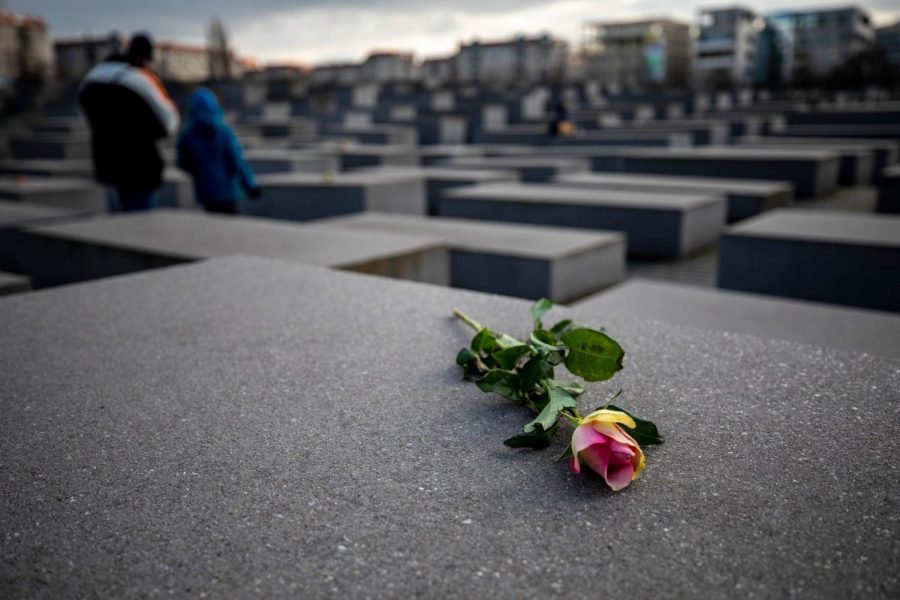Remembering The Holocaust 76 Years Later
January 28, 2021
On this day 76 years ago, Soviet troops entered Auschwitz-Birkenau, freeing the survivors of the largest concentration camp in Europe. In 2005, the United Nations General Assembly designated January 27th as International Holocaust Remembrance Day.
In 1933, before World War II, the Jewish population of Europe totaled over 9 million. By the end of the war in 1945, there were only 3.8 million Jewish people remaining.
Today, we remember the horrific genocide of the Jewish people during World War II in which the Nazi party in Germany systematically murdered over 6 million Jewish people. For further perspective, if we held a minute of silence for every victim of the Holocaust, we would be silent for at least eleven years.
As we mourn and remember these innocent lives lost, we cannot help but be reminded of the blatant antisemitism that is now pervasive in American society. We also are reminded of the importance of teaching this history to the future generations to come.
For a group that makes up less than 2.2 percent of the American population, the Jewish people are the number one target for religious-based hate crimes. In 2019, there were 953 Anti-Semitic hate crimes compared to the 176 Anti-Islamic hate crimes, the next highest number.
In a nationwide survey conducted just last year, 63 percent of those surveyed did not know that 6 million Jewish people were murdered in the Holocaust. This is certainly appalling. “If we let these trends continue for another generation, the crucial lessons from this terrible part of history could be lost,” said Greg Schneider, executive vice president of the Conference on Jewish Material Claims Against Germany. With fewer survivors of the Holocaust every year, it is of the utmost importance that we continue to share and spread history. Without it, humanity as a whole is doomed to make the same mistake.
Not only is there a lack of information on the Holocaust, but there is also misinformation on the Holocaust as well. Q-Anon, an alt-right conspiracy group, spreads harmful and incredibly misleading theories on the Holocaust. They promote (false) beliefs that the Jewish people control everything in the world, such as the banks, the media, and everything else in between. This hateful group has given rise to neo-Nazis in Germany, contributing to the worldwide spread of Antisemitism.
According to the Anti-Defamation League, Antisemitism can best be defined as “The belief or behavior hostile toward Jews just because they are Jewish.” After World War II, Antisemitism became less frequent in the Western hemisphere. However, the same stereotypes about Jewish people still existed, and still continue to exist today.
In 2021, Antisemitism is no longer a foreign concept. After the events at the Capitol earlier this month, a picture taken last year began circulating on social media which drew instant rage. A member of The Proud Boys, an alt-right white supremacist group, wore a shirt with the words “6MWE”, or 6 million weren’t enough, referring to the 6 million Jewish people killed in the Holocaust. Another picture taken at the Capitol insurrection shows Robert Keith Packer wearing a “Camp Auschwitz” shirt, with the words “Staff” on the back. Furthermore, in December of 2020, North Shore Hebrew Academy High School in Long Island, New York, faced a cyber anti-Semitic attack. Their school website and classroom pages featured photos of Hitler, Nazi SS guards, and derogatory slurs. The hackers leaked the teachers’ and students’ personal information, such as addresses, credit card numbers, and phone numbers. These terrible instances are just a slight glimpse of what the Jewish people are faced with.
On the 76th anniversary of the Auschwitz liberation, Irene Butter, a survivor of the Holocaust, brought our attention to the current events, “There are again echoes of the Holocaust. And on January 6, we saw it in our own country. When there was an attempted coup and rioting in Washington D.C., and some of the rioters wore Nazi symbols and used Nazi slogans. So it’s right back [in America],” she explains, “It is up to us, to the people, to preserve and protect our democratic institutions.”
We owe it to Irene that we educate future generations on the Holocaust; it should never be forgotten.
Today, we remember.
For further information on the Holocaust, please click here.
For a reading list on books concerning the Holocaust, please click here







